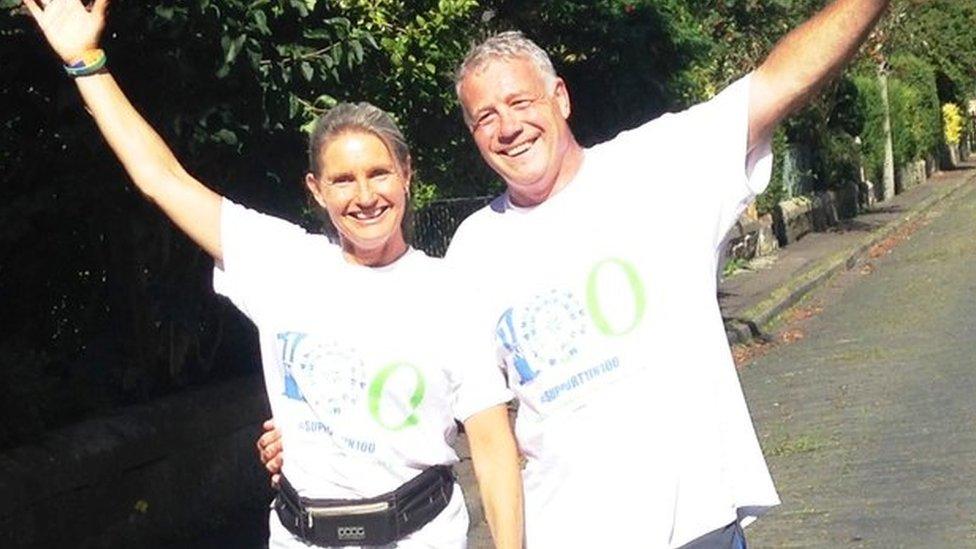Rugby star's wife talks of 'walking away'
- Published

Jenny and Scott Hastings are taking part in the 100 Streets Challenge
Former rugby star Scott Hastings and his wife Jenny have talked about how she disappeared from their Edinburgh home for 36 hours earlier this year.
Mrs Hastings walked for miles from her home in Trinity to the Pentland Hills during a period when she was suffering from depression.
The couple are now spearheading a charity campaign to keep people active and improve their mental wellbeing.
The 100 Streets challenge, external encourages people to get out with friends.
Support groups
Hastings, who won 65 caps for Scotland, said: "It's asking people to go out and either walk, jog or cycle 100 streets in support of Support in Mind Scotland, who do some marvellous work within the communities across Scotland to promote physical wellbeing, mental health and wellness."
The 52-year-old said his wife had suffered from mental health problems for many years.

Scott Hastings with his older brother Gavin, who also played rugby for Scotland, and their partners
"The way she gets out of the low periods within her life is actually to get out and get fresh air," he said.
Hastings said the idea of the 100 Street challenge was for people to get out and exercise with support groups of friends and families, rather than being alone.
"They can do it over one day or they can do 10 streets a day or one street for 100 days on the trot," he said.
"But it is all about raising awareness of mental health and, in fact, speaking to people and getting out and exercising is really important."
Jenny Hasting told the John Beattie programme that she hopes she can change her behaviour to avoid a repeat of the incident in March during which she wandered alone for hours.
She said: "I just had to get away from everyone. I felt I was in everybody's way and I needed to have some time away myself without telling anyone. I didn't want to be in contact with anyone."
Mrs Hastings ended up at the Harlaw reservoir in the Pentland hills.
"I walked all that way and then lay by the reservoir and contemplated on what was going on," she said.
She later got frightened because she had no way to contact anyone, having left her phone at home.
Scott Hastings says: "This pattern of behaviour is almost like a self-harm.
"There are self-harmers out there who abuse themselves, who cut themselves, who turn to alcohol for example.
"For Jenny it was all about taking herself out of a scenario."
The rugby star said his wife had gone missing before but there had always been a phone call before nightfall.

Scott Hastings playing for the British Lions in 1993
"This was actually rather worrying because she found herself in the middle of the night alone, unable to speak to anybody and with troubled thoughts," he said.
"It is very difficult to understand and contemplate what she is going through at the time.
"You have got to appreciate it is an illness and when people are ill they don't make correct decisions."
He said people who were suffering needed to understand they could speak to medical people, family or one of the phone helplines such as SAMH or Support in Mind Scotland.
He said he hoped this could stop someone leaving home and walking aimlessly in a mentally disturbed state.
Break the stigma
When Jenny went missing she got help by going into a police station.
She said: "The police were fantastic. They don't wish people to be disappearing. They want to be there to be a support and safe place for the likes of myself to be able to go and ask them for help.
"Not just a helpline, I can walk to the station and say 'I need help'.
"They offered that."
Jenny said the Support in Mind challenge was just the latest attempt to break the stigma of mental health and offer support.
She says: "I know I can talk with people and maybe that's one of the messages we are trying to get out.
"We all can talk with people. The stigma is definitely breaking down - even the Royals are talking about mental health."
- Published29 March 2017
